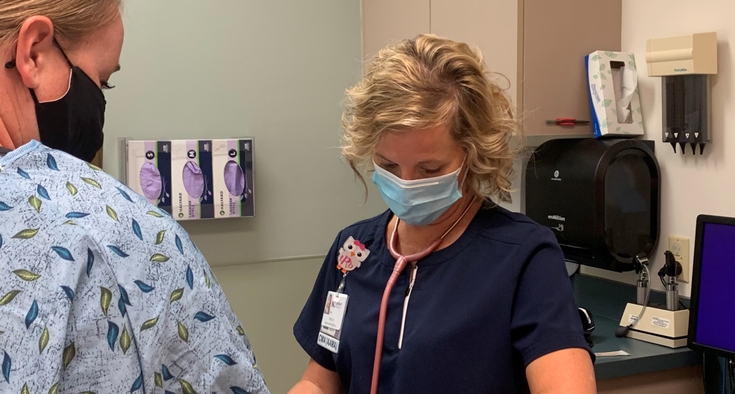Lizeth Ramirez-Prado started working at Novant Health Family and Internal Medicine South Brunswick when she was a medical assistant student at Brunswick Community College. As part of her program, she needed 200 on-site hours with a medical practice. She proved herself essential, and when a position became available after her graduation, she was hired.
And then she experienced a crisis.
“Shortly after Lizeth was hired last September, her mother – whom she lives with – was severely injured when she was hit by a car on her way to work,” said Joanne Campbell, regional manager for community health and wellness in the Coastal submarket. “She was hospitalized for weeks and had months of physical rehabilitation. Thankfully, her mother has done well, but … imagine the strain on Lizeth. Through it all, she remained committed and vigilant at home and at work. She is a real ‘rock star.’”
Ramirez-Prado's mom inspired her career as a certified medical assistant (CMA). When Ramirez-Prado was in ninth grade, her mother (reluctantly) went to the emergency room at Novant Health Brunswick Medical Center after weeks of headaches, chest pains and blurred vision. She was diagnosed with high blood pressure and hypothyroidism. “The doctors said if she had waited any longer, she may have had a heart attack and not made it,” Ramirez-Prado said.
According to the American Association of Medical Assistants, “Medical assisting is one of the nation's careers growing much faster than average for all occupations.” We talked to Ramirez-Prado about her job and why she loves it. Click here for job opportunities at Novant Health, and here for more information about working in the field.
Tell me about your role as a certified medical assistant.
I assist with our flu clinic, and I assist with nurse visits and help our patients who come in for regular shots – some come once a month, and some come every two weeks. I give their injections, like B-12 shots. I take patients’ blood pressure and temperatures. Because I sit up front, I also help our receptionists if they are on the

phone or when they get backed up.
So, your job hits on all areas that a CMA could be involved in – clinical, clerical and patient care?
Yes, and I like the variety. I’m never bored at work.
How and when did you know that this would be your career?
I was a high school freshman when my mom had to go to the ER. That’s when I knew; I saw everyone working together. I had that feeling that I had found my calling. That's really what it felt like. I told my mom: “I want to do this. I want to be the person next time who is helping someone's mother – or any family member that goes through what you went through. I want to be the person that does that.”
What steps did you take to make that happen?
When I was in high school, we had a club called HOSA (Future Health Professionals) that I joined. It’s for people who want to go into healthcare. You learn leadership, service and what it takes to be successful in the field.
Where’d you go to high school?
Here in Shallotte at West Brunswick High School.
You were born in Mexico, right?
Yes, in Veracruz. I came to the U.S. when I was 5.
What’s the best part of your job?
Whenever we have blood pressure patients come in and their blood pressure is high, and then we fix the problem. Either they go to the ER, or the provider changes their medication, and it's just like that feeling that you did something. You feel like you were part of getting them better.
And also my co-workers – they’re my work family, and they are very supportive always.
What’s the hardest part?
When you get close to patients who pass away. I think that's the hardest part. It can be just like losing a family member because they feel like family.
What attributes does a CMA needs?
Being caring, compassionate and wanting to help people. And being willing to study hard in school.
Since you're bilingual, I imagine you're indispensable in your office.
Yes, we do have some Spanish speakers who come here. So, it does help. Recently, two Hispanic people came in and they were speaking Spanish. One of my co-workers was like: I'm going to need your help.
Are you the only Spanish speaker in your office?
No, there's another Spanish-speaking CMA who went to school with me. She’s been my best friend since sixth grade.
So, if there's a Spanish-speaking patient who comes in, who you were not necessarily supposed to see, do you get pulled in sometimes to translate?
Yes. Sometimes, they just walk in, because they don't really know how health care works. So, we have to explain that they need to make an appointment. They aren’t used to going to the doctor and getting regular checkups.
My mother and my dad were like that. They both said: We don't go to the doctor's office; it’s too expensive, we don't have insurance, we can't afford this. Some Hispanic females – they’re kind of uncomfortable getting a Pap exam. It’s based on their culture and certain perceptions of how women are supposed to be. I’ve told my mom how important it is. She doesn't like getting her Pap test or breast exam, but she's like, “I know it's important. I’ll do it for you.”
Anything else you want to add?
This career is is worth the hard work you put in.When I was in school and my classes were hard, I sometimes thought about giving up. But this has been really worth me staying up late, taking all these exams.







